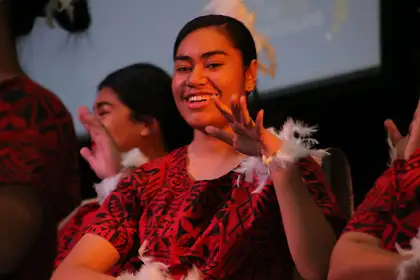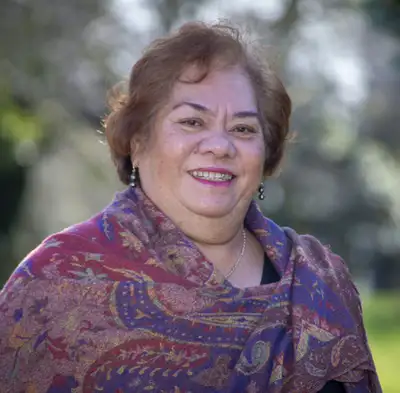
A key feature of the project is that it incorporates Pacific cultural values, concepts and languages into dialogue about education.
‘Talanoa Ako: Pacific talk about education and learning’, is a collaboration between Massey University’s professional learning and development unit, Tātai Angitu; Massey education researcher Dr Lesieli Tongati‘o, and the Ministry of Education.
The material in Talanoa Ako provides schools, early learning services, tertiary providers, leaders, teachers and educators with tools to ensure their curriculum, delivery and assessment is “culturally relevant and responsive to provide successful learning and teaching strategies for Pacific learners achieve across their education journeys,” Dr Tongati’o says.
It sets out to improve educational outcomes for Pacific learners by providing a framework for schools and their parents to work together for students’ progress and achievement in schools. This is achieved through guidelines and a reporting process designed to ensure schools are responsive so that Pacific parents are well informed of their children’s learning and progress throughout the year.
Dr Tongati‘o, Kaihautu Matauranga Pasifika – Pasifika Education Leader in Tātai Angitu, Institute of Education, College of Humanities and Social Sciences, is a long-standing advocate for more culturally responsive education for Pacific students. She is the lead researcher and author of one of the Talanoa Ako resources, Ngāue Fakataha ki he Ako ‘a e Fānau: Schools, Parents and Families Working Together to Better Understand and Support Pacific Students Progress and Achievement at School. It was launched recently by Associate Minister of Education (Pacific Peoples), Honourable Aupito William Sio.
A key feature of the project is that it incorporates Pacific cultural values, concepts and languages into dialogue about education. Available as an online and print resource, it provides practical guidelines for parents, school leaders, teachers, students, and school boards of trustees.
Pacific voices in education
“One of the gaps we wanted to address is that Pacific voices are never heard in most school contexts. So, we interviewed Pacific parents, school leaders, teachers, Pacific students, and their voices were all gathered to produce the report,” Dr Tongati‘o says.
The creation of the guidelines is the culmination of work that began when she was senior manager for Pacific education at the Ministry of Education.
Her research focused on the reporting process between the school, teachers and parents. This is often the only time that Pacific parents get invited to come into the school, she says.
Dr Tongati’o says the key message of the project is that schools need to work together with their Pacific parents. “Everyone has the goal of wanting to make sure all kids do well in school.”

Dr Lesieli Tongati‘o
What does it mean to be culturally responsive?
“The way in which teachers understand identity, language, and culture, and therefore select the content of their educational programmes, has significant implications for their students, because these are integral to who they are. Teachers also need to know the differences across and within Pacific cultures, and to know what it’s like to be Pacific.
“Being culturally responsive is really important in my view,” she adds.”All teachers need to know who is in front of them and whatever it is they bring into their learning.”
She believes the new guidelines should be taken up by all schools, even those with small numbers of Pacific students. “The Pacific population is growing all over the country. We can all learn from this,” she says.
“Everyone needs to know that Pacific parents want the best for their kids. There is still that assumption that Pacific kids don’t know much, they don’t know a lot of English, they won’t learn, they get grouped in the lowest level – that kind of stereotype needs to be flipped on its head. So, these resources are supporting schools to make a shift.”
Education visionary
Dr Tongati‘o is based in Massey’s Tātai Angitu, on the Manawatū campus. In 2014 she was made an honorary member of the New Zealand Order of Merit for her services to education and the Pacific community.
She came to New Zealand from Tonga to study science and maths at Massey, then returned to teach at Tonga Teachers College before undertaking postgraduate studies in education at Massey. She was academic director for a Pacific Senior Management development programme at Victoria University of Wellington before graduating in 2010 with a PhD in Pacific Studies and Education from Canterbury University, with her thesis ‘Ko e Fanā Fotu: Success in motion, transforming Pasifika education in Aotearoa New Zealand 1993-2009’.
She initiated the formation of the Ministry of Education’s Pasifika Advisory Group and served as its chief adviser. She also led the development of five Pasifika Education Plans, which cover how to further the educational achievement of Pacific children living in New Zealand, and has worked extensively as an education consultant across the Pacific region.
Dr Tongati'o is also a member of the Tongan Women’s Council of Aotearoa and has served as its secretary, vice president, president and adviser. She says she has always found the courage to ask questions about educational disparities – even as a lone Pacific voice in a large organisation. Growing up in Tonga, the eldest of four children, she says her parents were very supportive of their children’s education and inspired them to be unafraid to go as far as they can.
For more information on the project: https://pasifika.tki.org.nz/Talanoa-Ako